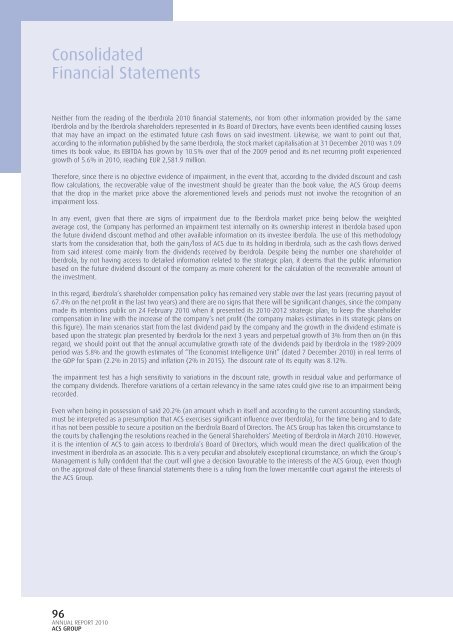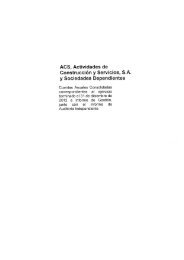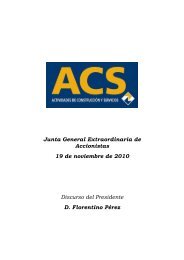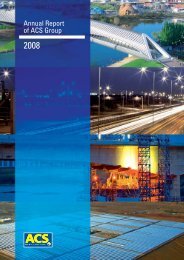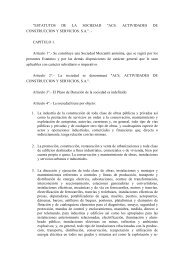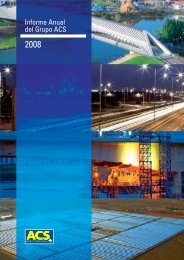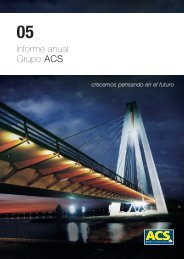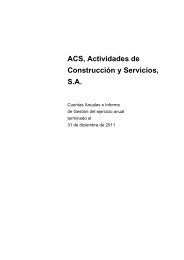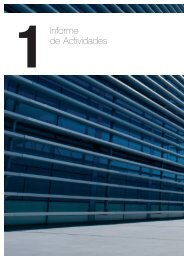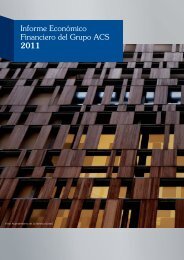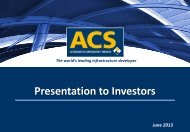Annual Report of ACS Group - Grupo ACS
Annual Report of ACS Group - Grupo ACS
Annual Report of ACS Group - Grupo ACS
Create successful ePaper yourself
Turn your PDF publications into a flip-book with our unique Google optimized e-Paper software.
Consolidated<br />
Financial Statements<br />
Neither from the reading <strong>of</strong> the Iberdrola 2010 fi nancial statements, nor from other information provided by the same<br />
Iberdrola and by the Iberdrola shareholders represented in its Board <strong>of</strong> Directors, have events been identifi ed causing losses<br />
that may have an impact on the estimated future cash fl ows on said investment. Likewise, we want to point out that,<br />
according to the information published by the same Iberdrola, the stock market capitalisation at 31 December 2010 was 1.09<br />
times its book value, its EBITDA has grown by 10.5% over that <strong>of</strong> the 2009 period and its net recurring pr<strong>of</strong>i t experienced<br />
growth <strong>of</strong> 5.6% in 2010, reaching EUR 2,581.9 million.<br />
Therefore, since there is no objective evidence <strong>of</strong> impairment, in the event that, according to the divided discount and cash<br />
fl ow calculations, the recoverable value <strong>of</strong> the investment should be greater than the book value, the <strong>ACS</strong> <strong>Group</strong> deems<br />
that the drop in the market price above the aforementioned levels and periods must not involve the recognition <strong>of</strong> an<br />
impairment loss.<br />
In any event, given that there are signs <strong>of</strong> impairment due to the Iberdrola market price being below the weighted<br />
average cost, the Company has performed an impairment test internally on its ownership interest in Iberdola based upon<br />
the future dividend discount method and other available information on its investee Iberdola. The use <strong>of</strong> this methodology<br />
starts from the consideration that, both the gain/loss <strong>of</strong> <strong>ACS</strong> due to its holding in Iberdrola, such as the cash fl ows derived<br />
from said interest come mainly from the dividends received by Iberdrola. Despite being the number one shareholder <strong>of</strong><br />
Iberdrola, by not having access to detailed information related to the strategic plan, it deems that the public information<br />
based on the future dividend discount <strong>of</strong> the company as more coherent for the calculation <strong>of</strong> the recoverable amount <strong>of</strong><br />
the investment.<br />
In this regard, Iberdrola’s shareholder compensation policy has remained very stable over the last years (recurring payout <strong>of</strong><br />
67.4% on the net pr<strong>of</strong>i t in the last two years) and there are no signs that there will be signifi cant changes, since the company<br />
made its intentions public on 24 February 2010 when it presented its 2010-2012 strategic plan, to keep the shareholder<br />
compensation in line with the increase <strong>of</strong> the company’s net pr<strong>of</strong>i t (the company makes estimates in its strategic plans on<br />
this fi gure). The main scenarios start from the last dividend paid by the company and the growth in the dividend estimate is<br />
based upon the strategic plan presented by Iberdrola for the next 3 years and perpetual growth <strong>of</strong> 3% from then on (in this<br />
regard, we should point out that the annual accumulative growth rate <strong>of</strong> the dividends paid by Iberdrola in the 1989-2009<br />
period was 5.8% and the growth estimates <strong>of</strong> “The Economist Intelligence Unit” (dated 7 December 2010) in real terms <strong>of</strong><br />
the GDP for Spain (2.2% in 2015) and infl ation (2% in 2015). The discount rate <strong>of</strong> its equity was 8.12%.<br />
The impairment test has a high sensitivity to variations in the discount rate, growth in residual value and performance <strong>of</strong><br />
the company dividends. Therefore variations <strong>of</strong> a certain relevancy in the same rates could give rise to an impairment being<br />
recorded.<br />
Even when being in possession <strong>of</strong> said 20.2% (an amount which in itself and according to the current accounting standards,<br />
must be interpreted as a presumption that <strong>ACS</strong> exercises signifi cant infl uence over Iberdrola), for the time being and to date<br />
it has not been possible to secure a position on the Iberdrola Board <strong>of</strong> Directors. The <strong>ACS</strong> <strong>Group</strong> has taken this circumstance to<br />
the courts by challenging the resolutions reached in the General Shareholders’ Meeting <strong>of</strong> Iberdrola in March 2010. However,<br />
it is the intention <strong>of</strong> <strong>ACS</strong> to gain access to Iberdrola’s Board <strong>of</strong> Directors, which would mean the direct qualifi cation <strong>of</strong> the<br />
investment in Iberdrola as an associate. This is a very peculiar and absolutely exceptional circumstance, on which the <strong>Group</strong>’s<br />
Management is fully confi dent that the court will give a decision favourable to the interests <strong>of</strong> the <strong>ACS</strong> <strong>Group</strong>, even though<br />
on the approval date <strong>of</strong> these fi nancial statements there is a ruling from the lower mercantile court against the interests <strong>of</strong><br />
the <strong>ACS</strong> <strong>Group</strong>.<br />
96<br />
ANNUAL REPORT 2010<br />
<strong>ACS</strong> GROUP


